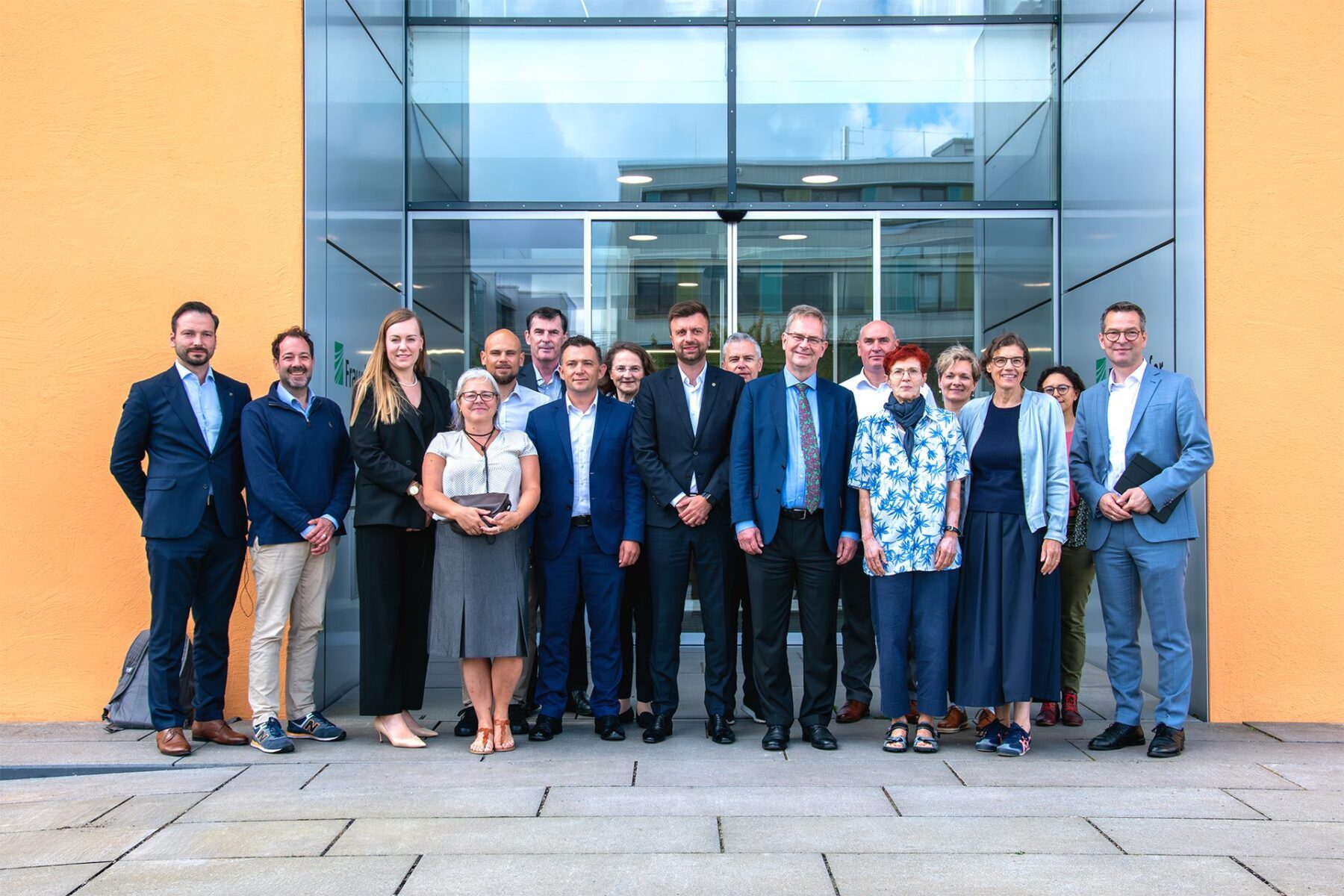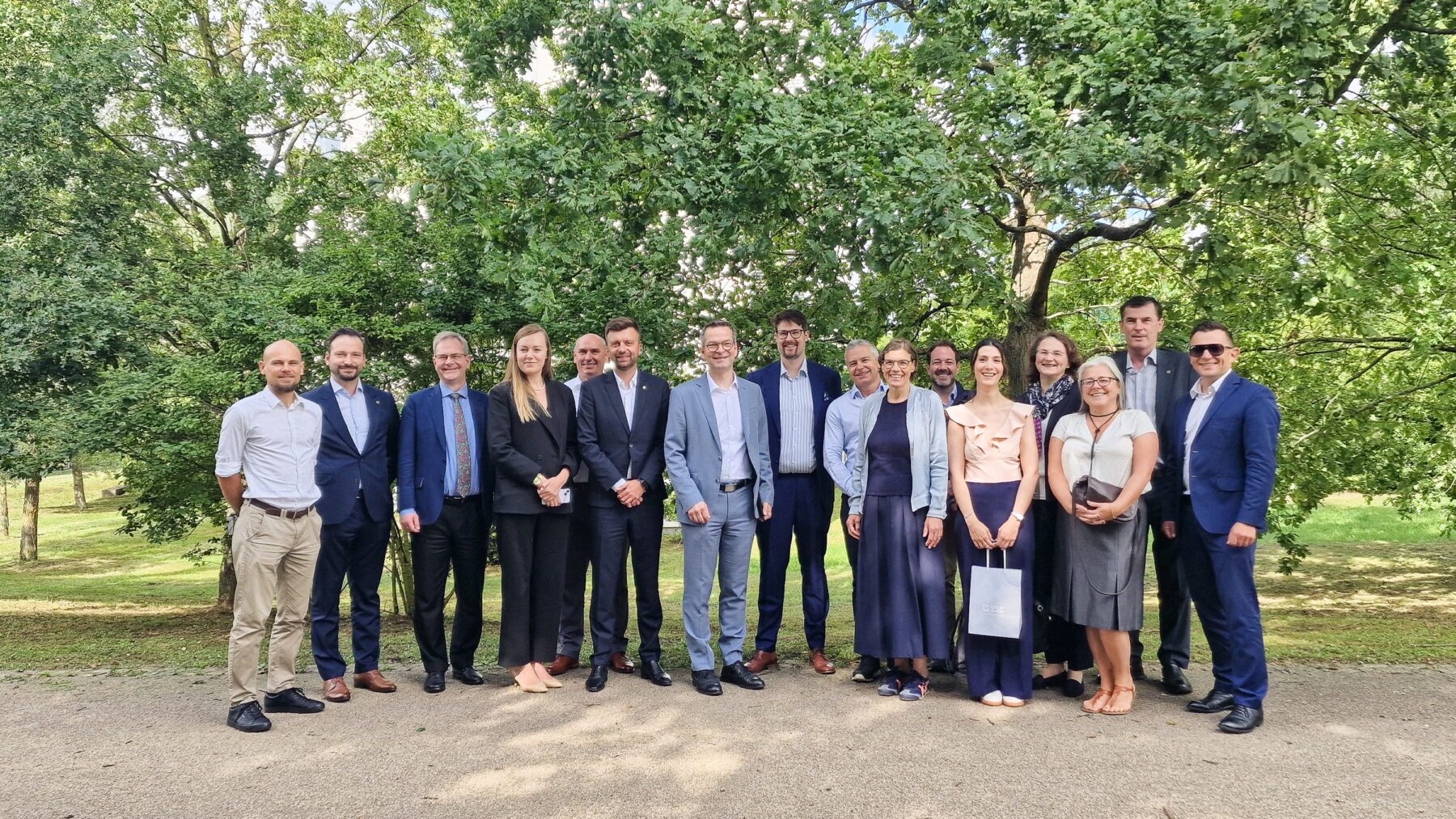
Science and Policy in Dialogue – Cross-Border Exchange: Delegation from Lower Silesia/Poland Visits Potsdam Science Park
A high-level delegation from the Lower Silesian Voivodeship visited the Potsdam Science Park and the Fraunhofer IZI-BB today to learn more about current research projects and explore opportunities for collaboration.
Agnes von Matuschka, Managing Director of Site Management at Potsdam Science Park, welcomed representatives from politics and business in Brandenburg alongside guests from the Lower Silesian Voivodeship, Poland. The event, held at the GO:IN start-up center, featured an introduction to the science and innovation hub. Two local start-ups showcased their pioneering work—CanChip in cancer research and kez.biosolutions in drug development using bioreactor-based methods.
Following a brief tour of the Potsdam Science Park, the delegation visited the Fraunhofer IZI-BB. The institute’s presentation focused on research at the Fraunhofer Center for Digital Diagnostics ZDD® and innovations in image-based cell sorting. Discussions centered on joint innovation and technology transfer opportunities between Brandenburg and Lower Silesia—especially in medical technology, digital health, and AI-supported diagnostics.
Dr. Eva Ehrentreich-Förster, Deputy Director of the institute, highlighted a core principle of the Fraunhofer IZI-BB:
“Following the One Health approach, we view human, animal, and environmental health as interconnected goods that must be protected through barrier-free access to prevention, detection, therapy, and disease management. Healthcare in rural regions presents a particular challenge—one we are addressing at the Fraunhofer Center for Digital Diagnostics ZDD® with targeted initiatives.”
The Polish delegation, which included senior representatives from the fields of economics, regional development, and international affairs, was accompanied by Brandenburg’s foreign trade and business development officials. The Potsdam Science Park has been growing steadily in recent years and is a key contributor to the region’s economic dynamism and attractiveness.
Michał Rado, Vice Marshal of the Lower Silesian Voivodeship, emphasized the importance of cross-border exchange in context with the visit of the delegation. He expressed strong interest in Brandenburg’s latest developments: “Our regions already collaborate across many sectors, but we won’t stop here. Lower Silesia is constantly evolving, and we are open to new areas of cooperation—particularly in healthcare. This creates new opportunities not just for our patients, but also for our medical professionals to learn new techniques and treatment methods,” said Vice Marshal Rado.
Brandenburg’s Minister for Economic Affairs, Prof. Dr.-Ing. Jörg Steinbach, also sees great potential in linking regional strengths: “Research and business don’t stop at national borders. We are committed to strengthening cooperation with our close neighbors. The partnership between Brandenburg and Lower Silesia opens up new opportunities for both regions,” the Minister stated.
The Fraunhofer IZI-BB is an independent department for Bioanalytics and Bioprocesses within the Fraunhofer Institute for Cell Therapy and Immunology IZI.
Weiterführende Informationen zu den vorgestellten Projekten des Fraunhofer IZI-BB
Sampling of the Future: A Launchpad for Digital Diagnostics
Fraunhofer ZDD®’s innovations in sample collection aim to transform a frequently overlooked pre-analytical step into the true engine of digital diagnostics. For example, single-use microfluidic cartridges that lyse, purify, and preserve samples in a single step make it possible to process blood, saliva, or urine directly at the point of collection for analysis. This ensures that even trace analytes reach the sensors intact. Point-of-care devices deliver reliable results within minutes, and mobile care services or patients at home can perform accurate diagnostics themselves. The approach lowers costs, shortens diagnostic pathways—especially in rural areas—and serves as a springboard for scalable, data-driven preventive and personalized medicine.
A New Era of Cell Sorting
The image-based cell sorting system developed in the Fraunhofer IMAGO project combines microfluidics, high-resolution microscopy, and AI-supported image analysis. Each individual cell passing through a microchannel is imaged in real time, classified based on predefined morphological or subcellular characteristics, and then gently separated using electrokinetic forces. This allows, for example, malignant cells, antigen-specific T cells, or virus-infected cells to be isolated for personalized therapies—as well as highly efficient yeast strains for use in the food industry. With customizable imaging modes (brightfield, multi-color fluorescence, quantitative phase contrast, and more), the technology unlocks an unprecedented level of sorting precision and opens new application areas in immunotherapy, stem cell research, and the analysis of tiny tissue samples.
Weiterführende Informationen zu den Start-ups
CanChip GmbH
Presented by: Founder and Managing Director Ghazaleh Madani
Founded in Potsdam in 2023, CanChip GmbH is revolutionizing cancer research with its innovative Tumor-on-a-Chip technology, overcoming the limitations of traditional models such as animal testing. By authentically replicating the human tumor microenvironment, the company accelerates drug screening and the development of new cancer treatments.
- Short Profile: “3 Questions for CanChip Founder Ghazaleh Madani”
- Focus: Cancer research, drug screening using Tumor-on-a-Chip technology
- Industry: Diagnostics
- Website: canchip.org
kez.biosolutions GmbH
Presented by: Founder and Managing Director Jan Degen
kez.biosolutions GmbH is a research lab specialized in polyketide derivatization. The company focuses on collaborative industrial R&D and the production of active pharmaceutical ingredients and fine chemicals—aiming to deliver the next generation of therapeutics from bioreactors.
- Short Profile: “3 Questions for kez.biosolutions”
- Focus: Research, active ingredient production
- Industry: Pharma
- Website: www.kez.bio
About the Potsdam Science Park
12,500 people study, research, and work at the Potsdam Science Park. As the largest science hub in Brandenburg, it spans 50 hectares and brings together three Max Planck Institutes, two Fraunhofer Institutes, and the faculties of human sciences, natural sciences, mathematics, and health sciences of the University of Potsdam. It also hosts a growing number of research-oriented companies in biotechnology, pharmaceuticals, diagnostics, health, and advanced materials.
A professional site management team supports business growth and company settlement, aligns the interests of all institutions at the location, and fosters networking across the capital region. Numerous services and programs support networking, internationalization, and the dynamic development of the expanding ecosystem. Under the umbrella brand Potsdam Science Park, the site management positions the innovation hub of the capital region and ensures visibility and recognition beyond Brandenburg’s borders. Since 2018, the shareholders of Standortmanagement Golm GmbH have been the City of Potsdam (51%) and the University of Potsdam (49%).
Contact
Fraunhofer IZI-BB / Science Communication
Dr. Sarah Dölle
Fraunhofer Institute for Cell Therapy and Immunology, Branch for Bioanalytics and Bioprocesses IZI-BB
www.izi-bb.fraunhofer.de
sarah.doelle@izi-bb.fraunhofer.de
Potsdam Science Park
Karen Esser
Standortmanagement Golm GmbH
karen.esser@potsdam-sciencepark.de
Image credit: cover image ©Fraunhofer IZI-BB
